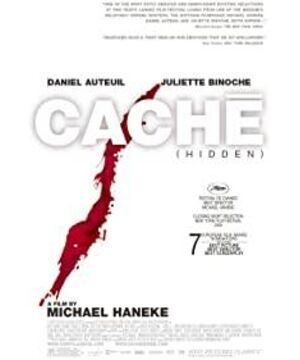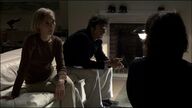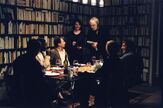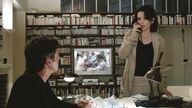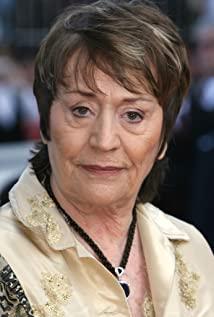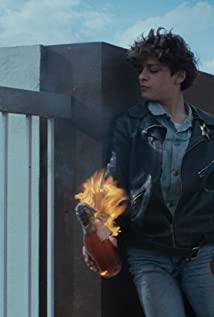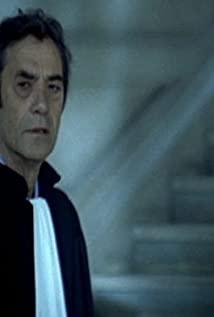When watching Caché, we must remember that the actions and words of the characters we see on the screen do not reflect their inner thoughts. The whole film insists on observing (peeps) from the external perspective, avoiding the inner portrayal, in order to restore the complexity of people in reality. Recognizing this, it is not difficult to find that the film has actually told us that George is not dissatisfied with the mistakes of childhood as he emphasized from beginning to end. In fact, his heart has always clearly known his own. cruel. To show this, the movie uses three insert shots that are both virtual and real. These three inserted shots are the only subjective perspective of the whole film, and they show lies. The opposite is to hide the peeking angle of the camera and show the truth. In the film, we continue to see the truth represented by the hidden camera ruthlessly piercing the lies that George tells around the secret. I'll talk about this later, let's first look at how the movie tells us that George is ashamed while avoiding inner portrayal.
The first insert shot appeared shortly after the beginning of the film. George and Anna received the second videotape and the attached first stick figure. Anna handed the stick figure to George. At this time, the insert shot appeared, and we saw a boy bleeding from his mouth (of course it was Majid, but the audience Don't know yet). After the insertion shot ended, the conversation between the couple continued, and George's tone was obviously flustered. This arrangement made it clear that the insertion of the shot was exactly what happened in George's mind: after seeing the stick figure, he immediately thought of Majid. If George, as he himself said later, had forgotten everything that happened in his childhood and paid no attention to it, he would not know the meaning at a glance at this sudden stick figure after forty years. In addition, after he had guesses in his mind, his first reaction was to hide: turn off the video tape and lie that he thought it was a prank by his son’s classmates; this eager cover also hinted that he was ashamed. This is his first lie to hide the secret, not only to hide his wife, but also to lie to himself. It has nothing to do with the past. Like the other lies he told later, this lie was immediately exposed. As if knowing that the painting hit him, similar cards were sent to his company and even his son’s school. When his son asked him what it meant with a card signed "Dad", he deceived himself. The lie will be self-defeating. After this, the second inserted shot appeared in the form of a dream, lasting longer than the first, further confirming to George (and the audience who are still unaware at this moment) the connection between the video tape and the card and the childhood past.
At a family dinner, George received a third videotape. This time, the videotape showed that his purpose was not to monitor, but to talk to George as an autonomous participant, and consciously made an affirmative response to his guess. In the next scene, George returns to the childhood home shown on the videotape. A conversation between him and his mother is one of the most important scenes in the film. There are some questions about several core themes, which will be discussed later. After talking with my mother, the third insertion shot appeared in the form of a dream. Like the first two insertion shots, it is not the truth, but a concrete representation of George's lie back then. Regarding these three lie-like subjective shots, my understanding is that in the face of irreversible sin, George subconsciously hopes that all the lies he tells are true. This is how Majid was sent away. For his own misfortune, he would not have to bear this guilt. George kept secret from the past and shied away from the past, which is the evidence that he has a guilty conscience; lying about not remembering it just shows that he has always remembered. When he was a child, selfish malicious slander wiped out another person's life. He realized that this sin cannot be redeemed, and he did not have the courage to face it, so he turned and fled to the opposite side. Just as he chose to use lies to cover up his jealousy when he was a child, now he continues to use lies to cover up his inner guilt. The more he denies the memory, the deeper the memory is carved. The more he denies his shame, the more he refuses to forgive him.
Having said so much to explain that George is not as indifferent as he appears, of course it is not to prove that he is a good man, but to try to get rid of the misunderstanding of most viewers about this character and even the film. How a person bears the sins of the past, how to face his conscience, and how to achieve liberation is a major issue discussed in the film; but Haneke’s ambition is more than that, he tightly ties this issue to another larger issue. Connected together-the indifference and selfishness of the French middle class, and the racial estrangement between the French middle class and the Algerians. The way of liberation that George's heart desires is to come true and transfer guilt instead of coexisting peacefully with Majid and growing up with Majid. This deeply reflects his extreme selfishness, as well as between the middle class and the bottom, the French and Algerians that he represents. It is difficult to bridge the gap between. As many commentators have pointed out, the references to racial issues in the film have also been expanded from individuals to groups through the echo of television news. I will not repeat this point.
George's social image is a successful person, but the film always portrays this image with deep suspicion. We went back to the conversation with our mother. My mother asked about George and Anna twice, and George’s answer was both good and bad, and there was no change from the last time ('We chug along. No highs or lows. I'm fine) , Anne's fine, Pierrot's fine'.) The success of the middle class represented by George means a boring, boring, and soulless life. He has a successful career and a happy family. On weekdays, three or five friends often come together. But after the movie enlarges this kind of life, what we see is not beauty, but indifference, suspicion, vain and indifference. What we see is love The distrust, the strict guard against the true feelings. When the mother repeatedly emphasized her love to the child, the child relentlessly broke away from her embrace and ran away. When the child refused to answer what was wrong, we saw the shadow of the protagonist in him-whether facing his mother or wife, whether facing concern or anger, George refused to tell what was hidden in his heart secret.
In addition to the movie title Caché ('Hidden'), which means "hidden camera", a deeper meaning is to bury the secrets of the sun in the depths of people's hearts. In the movie, we see a hidden camera with insight into the secrets, using ruthless honesty as a pick, digging through the graves of the past, digging straight to the bottom of the secret facts, and we have to show up. However, at this point, it can no longer be pushed forward. No matter how sharp the pickaxe of the hidden camera is, it still has nothing to do with the secret emotional layer. This reflects a hidden symptom in contemporary life: the connection between people is superficial, superficial, and based on etiquette. This hidden symptom has spread to the family of the atomic unit. Family members respect each other as guests, and can even say that they are happy and harmonious, but there is no trust or love between each other. Everyone is accustomed to guarding the innermost layer and building a solid foundation for it. Fortress. The hidden camera pierces the lies and perfunctions that bury the secret with the truth, but even if the truth is exposed, the distrust of love can still keep the core invulnerable.
It is this stubbornness that leads to the lack of dialogue between people. In the movie, almost all the dialogues are not real dialogues. Everyone uses the "words" taught by social etiquette to hide their true inner thoughts. This is why I emphasized at the beginning that you should not directly listen to the words spoken by the characters while watching the film. The fourth videotape that George received provided him with the location of Majid's residence, with the purpose of guiding him into a real conversation. George accepted the instructions, but refused to talk. Even after Majid's death, George still refused to talk to his son, no matter what the latter requested. The only time George asked for a dialogue was just after Majid committed suicide. The huge impact of the reality of death and bloodstaining made him unable to return to a decent life to face his hypocritical friends for a while. He slipped into the dark bedroom, did not dare to turn on the light, called his wife to drive away the guests and asked for a conversation. In this conversation, he confided the truth, but still could not confide the emotional truth. Between words, he still denied the torture of the past, never mentioning his true feelings, and used video tapes to change the subject when his wife asked questions. In fact, the video tape has long been irrelevant at this time, or in other words, the video tape has always been irrelevant. What the video tape does is just retelling the truth, and the truth itself is always there. George's reliance on lies and rejection of the truth made him never free. For the rest of his life, I'm afraid he will be like the day Majid died, afraid of seeing the light.
Of course, the end of the movie still gave a glimmer of hope. George and George’s generation are hopeless, but George’s son, Majid’s son, they may be able to put aside the grievances of history and start a real dialogue.
View more about Caché (Hidden) reviews


